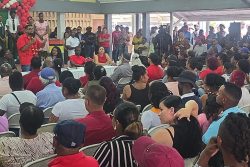Guyana’s ventilation at the Organization of American States’ Permanent Council meeting last week of the Linden crisis and the shape of things since the November 28, 2011 general elections is yet another sign of a government floundering and unwilling or perhaps incapable of coming to grips with reality.
What Ambassador Bayney Karran delivered to the Permanent Council meeting was as one-sided a version of the Linden events as one can cobble together. In so doing the OAS was made party to a politically partisan recounting of what was the largest community-driven protest in recent history and one that resulted in significant compromises albeit at a high price in lives lost and damage to property.
With limited involvement here apart from its five-year cycle of observing general elections, the OAS has now been put on notice to keep an eye on what the government has cast as “irresponsible” opposition, extremists and fringe elements. Ironically, even though they have no access to the Permanent Council, the OAS would be duty bound to give a fair hearing to the targets of the government’s ire and what Georgetown might have unknowingly succeeded in doing is to provide a plum platform for these groups to present a more balanced version to the OAS of the events at Linden. The appeal by Georgetown would seem to indicate that the government would be open to a fact-finding mission from the OAS and even perhaps mediation on the contentious issues. While there are many here who would welcome third-party mediation given the political paralysis that characterizes the dialogue among local parties this has not always been the outlook of the government unless they feel under significant pressure as was the case after the 2001 general elections. Is the government also going to take its case to CARICOM?
All that aside, one would have thought that Georgetown would have reserved approaches to the OAS and the goodwill it has quietly built up at the permanent council for much larger regional issues and crises that might definitely require the involvement of the OAS given its hemispheric membership. The last thing Georgetown should be doing is expending this goodwill on what is a purely domestic matter that is amenable to resolution right here and as a matter of fact had been substantially resolved by the time Ambassador Karran’s presentation was made in Washington.
What was unfortunate was the level of invective by the Ambassador. Community leaders, the opposition, the media and others have been painted as irresponsible. Is this really the confrontational direction that was intended when Prime Minister Sam Hinds signed the economic agreement with the Region 10 Chairman Sharma Solomon on August 21st? Was it not the case that the agreement was intended to draw a line under the events of July 18 and onwards with the expectation that the two sides would enter into sustained, amicable engagement on other issues? Why sign an agreement and then bitterly complain to a regional body about the behaviour of the parties to that agreement? Could that be an enabling environment for living up to the agreement or is there an implication that the government anticipates further difficulties perhaps as a result of the expectations from the agreement not being met?
Whatever the thinking behind it, the Ambassa-dor’s presentation on behalf of the government would be seen as harmful to the need to build trust between the government and the opposition and the government and people-driven movements like the one at Linden was. The government has ignored the fact that neither APNU nor the AFC was able to dissuade the people from pursuing their mission to ensure an honourable agreement on power tariffs. It should also be noted that their spontaneous and sustained protests had begun as far back as April 5 without the formal involvement of political parties. Even up to the day of the intended signing of the deal it was the demand of the community – not APNU or the AFC –that led to the one-day delay in the affixing of signatures and the expunging of the clause that required the investigation of the forces behind the Linden protest.
Another possible reason why the government approached the OAS was to blunt the very direct condemnation by the Inter-American Commission on Human Rights of the killing of the three Linden protesters by the police on July 18. The IACHR is an autonomous body of the OAS whose mandate is to protect human rights. It is comprised of seven independent members who serve in a personal capacity and on August 3rd, it delivered a stinging criticism of the state and the police over the killings.
Its statement said in part:
“The Inter-American Commission on Human Rights (IACHR) condemns the killing of three persons during the repression by security forces of a protest in Linden, Guyana. The IACHR calls on the State of Guyana to use force in strict conformity with its international obligations and the applicable international principles.
“According to the information received, police officers fired live rounds at protesters in Linden, killing three men and injuring about 20 others. Authorities have announced that … Guyanese President Donald Ramotar is committed to forming an independent commission of inquiry to investigate the events.
“The IACHR reminds the State of its obligation to conduct a judicial inquiry into the deaths of these persons and the acts of violence, sanction those responsible and repair the consequences. Furthermore, the Inter-American Commission reminds that it is necessary to adopt mechanisms to prevent excessive use of force on the part of public agents in marches and protest demonstrations. In this regard, the IACHR calls on the State to urgently adopt all necessary measures for the due protection of the protesters within the framework of respect of inter-American human rights standards.”
That stinging rebuke must have caught the government off guard and it could have concluded that the best defence against it was a hearing within the chambers of the OAS’ Permanent Council.
Whatever the reason for recourse to the OAS, the informed and discerning Guyanese man/woman in the street will see it as further recognition that the government refuses to accept that it has lost control of Parliament and its vast powers, all in keeping with the provisions of the Constitution and laws of Guyana. Why else would the Ambassador advise the Permanent Council about cuts to the budget by virtue of the one-seat majority? Why would he cite the election of a Speaker of Parliament and Deputy from the ranks of the opposition? Why would he refer to the domination of the Parliamentary committees by the opposition and about the government being challenged at every level in the legislature? There is nothing illegitimate about any of this. It is the reality of the new circumstances – the expression of the will of the people on November 28. The converse of the Ambassador’s argument would be the joint opposition descending on the Permanent Council and complaining that even though combined it had won the majority of votes at the general election it is not being allowed to govern.
The train of the Ambassador’s arguments, the frequent resort of the government to the courts and the overall approach of the Office of the President and Freedom House to the opposition-controlled Parlia-ment bespeaks of a complete blindness to the reality of the results of the November 28 general elections. The harsh truth is that the government has lost the ability to have its way with any of the powers accorded to the legislature that it so cavalierly rode for the 19 years before last year’s general elections. It needs to be brought quickly to reality. Running hither and thither and appealing to the OAS won’t win it the ability to have its way with the legislature or win it a passport to continue its stalling tactics. It has to sit down with the opposition and craft mature deals that benefit the country. That is the only way forward. It should not have taken it nine months to see this neither should it have been necessitated by the one-month-long struggle by Lindeners.
Perhaps the most judicious line uttered at the Permanent Council session was that by the Secretary General Jose Miguel Insulza. He said simply “We think that dialogue is the best way to deal with this matter”. Indeed.








